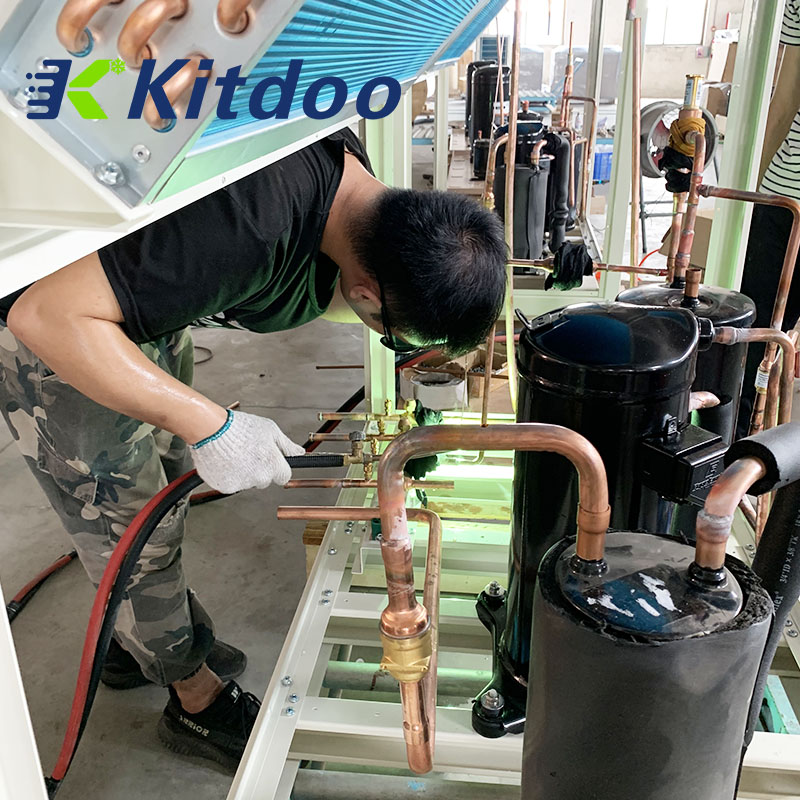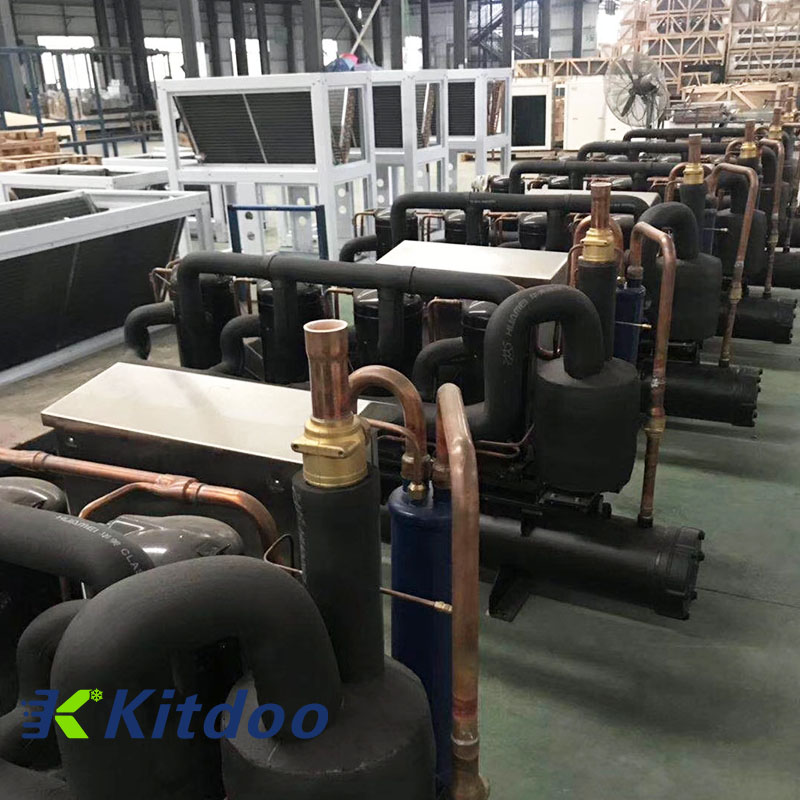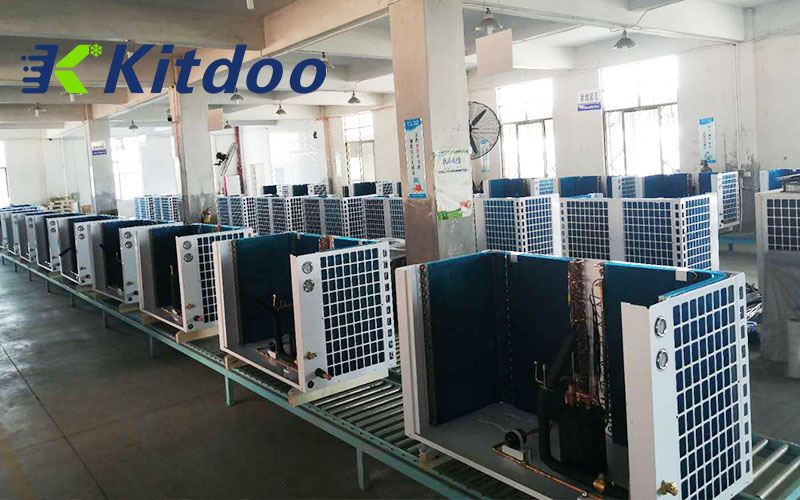KITDOO COOlING is a company integrating design and production of refrigeration equipment. KITDOO can give you professional one-stop service for cold chain.
This issue mainly introduces the common problems of the after-sales maintenance of the condensing unit.
1. Liquid back
1). For refrigeration systems using expansion valves, liquid return is closely related to the improper selection and use of expansion valves. Excessive selection of the expansion valve, too small superheat setting, incorrect installation of the temperature sensing bulb, damaged adiabatic dressing, and failure of the expansion valve may cause liquid back.
2). For a small refrigeration system that uses capillary tubes, too much liquid will cause liquid back.
3). When the evaporator is severely frosted or the fan fails, the heat transfer becomes poor, and the unevaporated liquid will cause liquid back.
4). Frequent fluctuations in the temperature of the cold storage will also cause the expansion valve to malfunction and cause liquid back.
For refrigeration systems where liquid return is difficult to avoid, the installation of a gas-liquid separator and the use of pump-down shutdown (that is, let the compressor drain the liquid refrigerant in the evaporator before shutdown) control can effectively prevent or reduce the hazard of liquid return.
2. Start with liquid
1). When the return air cooling compressor is started, the phenomenon that the lubricating oil in the crankcase foams violently is called start with liquid.
2). The foaming phenomenon when starting with liquid can be clearly observed on the oil sight glass.
3). The root cause of starting with liquid is that a large amount of refrigerant dissolved in the lubricating oil and sinking under the lubricating oil suddenly boils when the pressure drops suddenly and causes the lubricating oil to bubble. The duration of bubbling is related to the amount of refrigerant, usually several minutes or ten minutes. A lot of foam floated on the oil surface and even filled the crankcase. Once sucked into the cylinder through the intake duct, the foam will be reduced to liquid (a mixture of lubricating oil and refrigerant), which can easily cause liquid hammer. Obviously, the hydraulic shock caused by starting with liquid only occurs during the starting process.
4). Unlike liquid flood back, the refrigerant that caused the start with liquid enters the crankcase by means of "refrigerant migration". Refrigerant migration refers to the process or phenomenon that the refrigerant in the evaporator enters the compressor in gas form through the return line and is absorbed by the lubricating oil when the compressor stops running, or is mixed with the lubricating oil after being condensed in the compressor.
5). After the compressor is stopped, the temperature will decrease and the pressure will increase. Because the partial pressure of refrigerant vapor in the lubricating oil is low, it will absorb the refrigerant vapor on the oil surface, causing the phenomenon that the crankcase air pressure is lower than the evaporator air pressure. The lower the oil temperature and the lower the vapor pressure, the greater the absorption power for refrigerant vapor. The steam in the evaporator will slowly "migrate" to the crankcase. In addition, if the compressor is outdoors, in cold weather or at night, its temperature is often lower than that of the indoor evaporator, and the pressure in the crankcase is also lower. After the refrigerant migrates to the compressor, it is easy to be condensed and enter the lubricating oil.
6). Refrigerant migration is a very slow process. The longer the compressor is down, the more refrigerant will migrate into the lubricating oil. This process will proceed as long as there is liquid refrigerant in the evaporator. Because the lubricant with dissolved refrigerant is heavier, it will sink to the bottom of the crankcase, and the floating lubricant can absorb more refrigerant.
7). Due to structural reasons, the pressure of the crankcase will decrease much more slowly when the air-cooled compressor is started, the foaming phenomenon is not very severe, and the foam is also difficult to enter the cylinder, so the air-cooled compressor does not have the problem of liquid hammering when starting with liquid.
8). Theoretically speaking, the installation of a crankcase heater (electric heater) on the compressor can effectively prevent the migration of refrigerant. After a short period of shutdown (such as at night), keeping the crankcase heater energized can make the lubricating oil temperature slightly higher than other parts of the system, and refrigerant migration will not occur. After a long period of shutdown (such as a winter), heating the lubricating oil for several or ten hours before starting the machine can evaporate most of the refrigerant in the lubricating oil, which can greatly reduce the possibility of liquid shock when starting with liquid. It can also reduce the harm caused by refrigerant scouring. However, in practical applications, it is difficult to maintain the heater's power supply after shutting down or to supply power to the heater more than ten hours before starting up. Therefore, the actual effect of the crankcase heater will be greatly reduced.
3, oil return
1). When the compressor is higher than the evaporator, the oil return bend on the vertical return pipe is necessary. The return bend should be as compact as possible to reduce oil storage. The spacing between the oil return bends should be appropriate. When the number of oil return bends is large, some lubricant should be added.
2). The oil return pipeline of the variable load system must also be careful. When the load is reduced, the air return speed will decrease, too low speed is not conducive to oil return. In order to ensure the oil return under low load, the vertical suction pipe can adopt double vertical pipes.
3). Frequent starting of the compressor is not conducive to oil return. Since the compressor stops for a short continuous operation time, there is no time to form a stable high-speed air flow in the return pipe, and the lubricating oil can only stay in the pipe. If the oil return is less than Ben oil, the compressor will be short of oil. The shorter the operating time, the longer the pipeline and the more complex the system, the more prominent the oil return problem.
4). Lack of oil will cause serious lack of lubrication. The root cause of the lack of oil is not the amount and speed of the compressor's running oil, but the poor oil return of the system. The installation of an oil separator can quickly return oil and extend the compressor running time without oil return.
5). The design of evaporator and return gas pipeline must take oil return into consideration. Maintenance measures such as avoiding frequent starting, timing defrosting, timely replenishment of refrigerant, and timely replacement of worn piston components also help to return oil.



Tags :